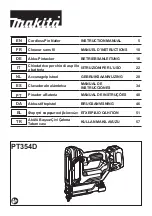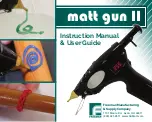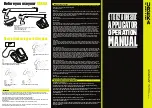
9 ENGLISH
Test safety systems for possible fault before operation
as follows.
1.
Unload pin nails from the tool and keep the maga-
zine opened.
2.
Install the battery cartridge and release the trigger
lock.
3.
Only pull the switch trigger without touching the
contact element against the material.
4.
Only touch the contact element against the mate-
rial without pulling the switch trigger.
If the tool operates in the case of 3 and 4 above, the
safety systems are faulty. Stop using the tool immedi-
ately and ask your local service center.
Driving pin nails
WARNING:
Continue to place the contact
element firmly on the material until the pin nail is
driven completely.
Unintentional firing may cause
personal injuries.
1.
Release the trigger lock.
2.
Place flat the contact element on the material.
3.
Pull the switch trigger fully to drive a pin nail.
4.
To drive the next pin nail, release your finger from
the switch trigger once, and then repeat the step 2 and
3 above.
►
Fig.14:
1.
Switch trigger
2.
Contact element
You can also drive the pin nails when dragging the
tool to the next area with the contact element pressed
against the material and pulling the switch trigger.
►
Fig.15
If the head of the pin nail remains above the workpiece
surface, drive the pin nail while holding the pin nailer
head firmly against the workpiece.
►
Fig.16
NOTE:
If the head of the pin nail still remains above
the workpiece even you hold the pin nail head,
the material may not be suitable for the pin nailer.
Continuing to use the pin nailer on such material may
result in a damage to the driver of the pin nailer and/
or pin nailer jamming.
Anti dry fire mechanism
WARNING:
Always make sure that your
fingers are not placed on the switch trigger or
the contact element and the battery cartridge is
removed before loading the pin nailer.
When the number of remaining pin nails in the maga
-
zine are 0 - 3 pieces, the switch trigger can no longer be
pulled. At this time, insert a new strip of pin nails in the
magazine and the switch trigger can be pulled again.
NOTE:
When firing a different length of pin nails
shortly after the anti-dry firing device has actuated,
insert a new strip of pin nails into the magazine and
fire away all the prior pin nails that have remained on
junk material.
Checking remaining pin nails
You can check the amount of remaining pin nails
through the sight window.
The red indicator moves toward fastening opening with
the amount of remaining pin nails become smaller.
►
Fig.17:
1.
Sight window
2.
Indicator
Removing jammed pin nails
WARNING:
Always make sure that the battery
cartridge is removed before removing jammed pin nails.
Take out pin nails that remain inside the magazine.
Remove three screws with the hex wrench that are
securing the driver guide cover.
Take the jammed nails from the nail guide groove that
has appeared.
When it is difficult to take out the jammed nails, further
remove two screws with the hex wrench that are secur-
ing the contact top cover. Then take them out.
►
Fig.18:
1.
Driver guide cover
2.
Screw
3.
Contact
top cover
MAINTENANCE
CAUTION:
Always be sure that the tool is
switched off and the battery cartridge is removed
before attempting to perform inspection or
maintenance.
NOTICE:
Never use gasoline, benzine, thinner,
alcohol or the like. Discoloration, deformation or
cracks may result.
To maintain product SAFETY and RELIABILITY,
repairs, any other maintenance or adjustment should
be performed by Makita Authorized or Factory Service
Centers, always using Makita replacement parts.
OPTIONAL
ACCESSORIES
CAUTION:
These accessories or attachments
are recommended for use with your Makita tool
specified in this manual.
The use of any other
accessories or attachments might present a risk of
injury to persons. Only use accessory or attachment
for its stated purpose.
If you need any assistance for more details regarding
these accessories, ask your local Makita Service Center.
•
Pin nails
•
Makita genuine battery and charger
•
Safety goggles
NOTE:
Some items in the list may be included in the
tool package as standard accessories. They may
differ from country to country.










































